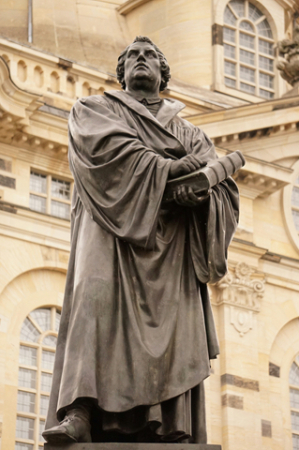
Yesterday, October 31, was Reformation Day, and Lutherans around the world held various events in commemoration. In Singapore, the Lutheran Church advocated for Christian communion, while the German Lutheran Church encouraged believers to face the challenge of “trusting in the power of grace in a merciless time.”
Commemorating the 25th Anniversary of the Joint Declaration on the Doctrine of Justification
Reformation Day is a Protestant observance primarily celebrated by the Lutheran church annually on October 31 to commemorate Martin Luther’s initiation of the Protestant Reformation. On October 31, 1517, Luther posted his Ninety-Five Theses in Wittenberg, Germany, sparking academic debate. In his theses, Luther challenged the prevalent belief that people could pay their way to the forgiveness of sins using money. Luther opposed the common belief and practice that forgiveness could be bought, instead teaching that salvation comes through faith alone—a position that marked the start of the Reformation.
Then on October 31, 1999, Lutheran and Catholic leaders signed the Joint Declaration on the Doctrine of Justification (JDDJ) in Augsburg, Germany. Now in 2024, churches are celebrating both the 25th anniversary of this historic document and the 10th anniversary of its Chinese edition. This historic agreement resolved centuries-long misunderstandings over the “fundamental truth” that salvation is a free gift from God.
According to the Lutheran World Federation, this year’s Reformation Day celebrations took place worldwide, with various events highlighting the diversity of Lutheran traditions.
Singapore: Advocating Christian Unity
The celebrations at the Lutheran Church in Singapore focused on fostering Christian unity, welcoming Anglicans, Methodists, Presbyterians, and Lutherans. The events included a shared dinner, followed by a program featuring a message from Bishop Lu Guan Hoe and presentations from groups such as “Women in Church and Society,” an intergenerational group, and a dance group.
Germany: In merciless times, to trust in the power of grace.
The Evangelical Lutheran Church in Northern Germany (Nordkirche) held its annual Reformation Reception themed “Walking Together.” Representatives from the Catholic Church also attended. “In a world suffering from wars and various forms of violence and polarization that divide the human family, the JDDJ is a sign of peace, pointing to the possibility of reconciliation,” said Bishop Kristina Kühnbaum-Schmidt, who also serves as LWF Vice-President for Central Western Europe. Today’s challenge, she noted, is, “How can we succeed in trusting in the power of grace in a merciless time.”
South Africa: Commemorating Peaceful Liberation
Under the theme “Heroes of the South,” the Lutheran Communion in Southern Africa (LUCSA) highlighted reformers from its member churches who had made significant theological contributions both within their congregations and beyond. On Reformation Day, they honored Rev. Dr. Johannes Lukas de Vries (1939–2001) in a ceremony that was live-streamed on Facebook. De Vries, recognized as the first non-white President of the Evangelical Lutheran Church in South West Africa (ELK/SWA), which is now known as the Evangelical Lutheran Church in the Republic of Namibia (ELCRN), was a strong advocate for Black Theology in Namibia and dedicated to the cause of peaceful liberation.
Argentina: Proclaiming faith and serving the community
The theme at the Alto Uruguay Congregation in Misiones, part of the Evangelical Church of the River Plate (IERP) in Argentina, last Sunday was “The Reformation embraces us in serving the neighbor.” District Pastor Dario Dorsch remarked, “Our church service visualized the deep meaning of what it means to be a church that comes from the Lutheran Reformation; it helped us to remember that we are free to serve and to love.”
To put this message into action, groups of congregants tackled various topics related to diakonia within their district. One group dedicated their efforts to visiting patients in the regional hospital and learning about a church initiative that supports individuals facing challenging circumstances in medical settings. Another group worked on assisting Indigenous communities, promoting the “Tape Porá” project, which has benefited 16 communities by enhancing infrastructure and improving access to water and electricity.
The day wrapped up with “The Embrace,” a program led by the district’s youth that emphasized the therapeutic and emotional significance of embracing as a gesture of solidarity and communion. During the closing worship, participants demonstrated their unity in the church by holding hands, sharing hugs, and reciting the Lord’s Prayer together, reaffirming their commitment to faith and community service.







